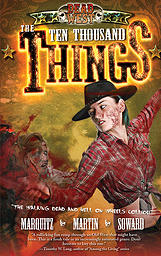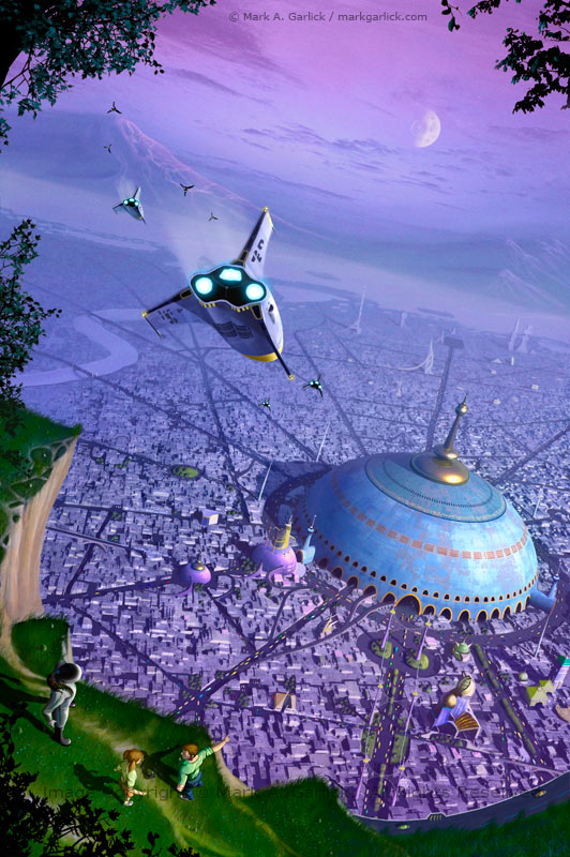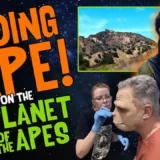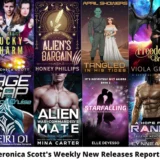In my last post , I reviewed one of the latest titles from Ragnarok Publications. The authors of that book, The Ten Thousand Things are also the driving force behind Ragnarok. Two of the three authors (Tim Marquitz and Joe Martin) agreed to interviewed. The third author, Kenny Soward, was busy with a writing project and was not able to participate. That’s okay, because we want him writing.
, I reviewed one of the latest titles from Ragnarok Publications. The authors of that book, The Ten Thousand Things are also the driving force behind Ragnarok. Two of the three authors (Tim Marquitz and Joe Martin) agreed to interviewed. The third author, Kenny Soward, was busy with a writing project and was not able to participate. That’s okay, because we want him writing.
Keith West for Amazing Stories Magazine: Tell me a little about yourselves.
Tim Marquitz (TM): I was born a poor white child in a… Sorry. Jerk humor. I’m the Editor-in-Chief and co-publisher of Ragnarok Publications, and an author, my primary series being the ‘Demon Squad,’ an urban fantasy adventure from Hell. Literally. And I’ve just made the move to writing/publishing full time, so I’m at home with my wife and daughter and make up stuff I hope people will enjoy.
Joe Martin (JM): I’ve been in the comics business and been a freelance editor and copywriter for, like, ever. I’ve held a couple managing editor positions, namely working at Caliber Comics in the ‘90s and Privateer Press in the ‘00s. When I hit my forties, I suddenly got a hankering to be my own boss and publish dark fantasy books. Meeting Tim Marquitz on Facebook spurred this into action, since we were both sort of in the same mindset. We agreed he’d handle editorial and I’d take on the mantle of Creative Director, so there we are.
ASM: How did you come to write the Dead West series?
TM: Joe and I were discussing the idea, which he’d sort of picked up during an online chat with another fellow, and it sounded fun. Joe wanted to do zombies, but do them epically. He had the Sergio Leone-directed Spaghetti Westerns and films like The Alamo in mind for atmosphere, but also wanted to add a base of historical accuracy. From there, we recruited Kenny Soward, who jumped in super excited and brought his own voice and charm with him. After that, the concept evolved further into mystical philosophy and all sorts of interesting ideas.

JM: Tim’s right on. I’m a fan of The Man with No Name and love the “Dollars Trilogy.” When a crude concept came to mind of that ghostly atmosphere compounded with monsters and mysticism, especially the zombies we call ‘deaduns,’ the lure was too much. I pushed to get started and Tim and Kenny were more than receptive.
ASM: Explain your collaborative process.
TM: We brainstorm ideas, usually on Facebook, just jumping all over the place, thinking of things we’d like to see and write about. After we have a vague direction, I write the outline, leaving it loose enough so that the other two can adjust as they see fit. Then, Kenny gets to writing. He does the bulk of the work, then Joe and I add our bits and pieces, editing as we go, and basically making it into all of ours. As the books progress, Joe and I are adding more and more of our voice to the story, doing our best to complement what Kenny’s written without overriding him.
ASM: So who wrote the sex-in-the-woods scene in The Ten Thousand Things?
TM: We all promised to blame Joe, but to be honest, I have no clue. I don’t recall the specific scene from the first draft I read, but that doesn’t mean anything. Actually, I think Joe just went through and added the word ‘moist’ as many times as he could.
JM: That is not true. Kenny is the one who’s most in touch with his inner goddess. Have you seen his vlogs? The man twerks almost every episode. Not that there’s anything wrong with that; I just believe there is a right time and place for twerking. But honestly, Kenny wrote the bulk of that scene, and I ‘massaged’ it a little here and there, but overall it’s mainly his. Why do you ask?
ASM: Um, nor reason, just curious. Oooh-kay, moving on, how many volumes do you anticipate there being in the Dead West series?
 JM: We set out to do six novels, but we’re finding there is a lot of opportunity to expand the series, so we’re talking about at least two offshoots, one of which we’re calling Dead West 3.5 for now. It will feature the monk that appeared in Kaiju Rising: Age of Monsters, thanks to author Ed Erdelac. His story, “Devil’s Cap Brawl,” takes place in the same world as the Dead West series.
JM: We set out to do six novels, but we’re finding there is a lot of opportunity to expand the series, so we’re talking about at least two offshoots, one of which we’re calling Dead West 3.5 for now. It will feature the monk that appeared in Kaiju Rising: Age of Monsters, thanks to author Ed Erdelac. His story, “Devil’s Cap Brawl,” takes place in the same world as the Dead West series.
TM: We’ve also decided to do a few pieces chronicling different characters—perhaps past histories—as well as a couple that sidle alongside the main books just to fill out the world and characters. I’m about to start writing Dead West 1.5 here in the next few weeks, in fact.
ASM: Tell me a little about Ragnarok Publications. How is it different from other small presses?
TM: At Ragnarok we’re creators first. To have longevity in publishing you obviously need to make money, and we do realize it is a business, but our goal has always been to find different and creative people to work with. We’re taking in stories that we think are amazing, but might not fit into the narrow niche in bigger, more traditional publishing. We don’t want clones of already successful works. We want original, thought-provoking, left field stories that have a real impact on our readers.
![]() JM: One thing that is paramount to this is going above and beyond to make Ragnarok “author friendly.” Tim and I have been big on that from the onset, and our contracts are based on the idea of loyalty.
JM: One thing that is paramount to this is going above and beyond to make Ragnarok “author friendly.” Tim and I have been big on that from the onset, and our contracts are based on the idea of loyalty.
TM: Exactly. We’re not out to bilk authors so that we can get rich. We just want to put out great books, and be as successful as we possibly can while treating our authors with respect and rewarding them for their hard-fought efforts.
JM: Writing novels isn’t an easy thing to do.
TM: Writing good novels isn’t an easy thing to do.
JM: Right on. What he said.
ASM: So what opportunities do you see for new authors in the current publishing climate?
TM: They’re endless. When I first started, a mere five years ago, publishing was much tighter, more focused on the idea of the Big Six — or Big Five, whatever they are these days — and self-publishing carried a stigma.

JM: It still does.
TM: Yeah, it does, but nowhere near as bad, in my opinion. I mean, these days, so many authors have broken out on their own. They’re making their careers without agents and big houses telling them how it needs to be done.
JM: You also figure readers are making the shift too, taking a chance on independent publishers and self-published authors, and finding these offerings are just as good, if not better in some cases, as what the Big Five is putting out there.
TM: Yeah, so that alone has opened the door to a ton of new authors and opportunity. And I think the climate is set for this trend to keep growing.
ASM: Name four authors you’d love to have dinner with, living or dead, and why?

TM: I’ve always been a huge fan of Clive Barker, and I would love to sit down and pick his brain in person. That would be amazing. Outside of that, I have a bunch of author friends and acquaintances I deal with online but haven’t met in person. There would be way more than four, but I’d really enjoy sitting down with all of them.
JM: For me, no doubt about it, David Gemmell. He is number one. When I read he had passed away back in 2006, I didn’t breathe for the longest time. My heart just sank. To me, it was as if a personal friend had died, because I’d gotten to know the Big Man through his works, and his stories resonate with me. Let’s see, besides Gemmell, my other idols are dead too, it seems; R.E. Howard, Edgar Rice Burroughs, and H.G. Wells, all of which broke new ground and penned powerful works of fantasy.
ASM: If you were conducting this interview, what question would you ask that I haven’t?
TM: I would have asked if we wanted a beer.
JM: I would have asked, “What makes Ragnarok so kick-ass?” To which I would answer, “Gosh. That’s a great question. I wish I knew! I guess we just are. It’s, like, in our DNA or something.”
ASM: Thank you both for taking time to answer my questions.









